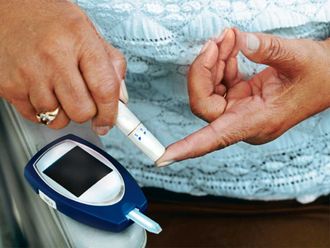
Highlight
As the rate of overweight children is on the rise, diets, physical activity and policing the pantry can work, say experts
A diet is not such a hassle in a child’s life, at least in the initial stages. Weight gain is considered cute in babies: As we smother their chubby cheeks with kisses, gush over the fat rolls on the thighs and happily feed them all they want. Until suddenly, the baby grows into an overweight child and health becomes a huge concern.
With obesity comes a long list of life-threatening ailments: hypertension, Type 2 diabetes, heart disease, cancer, liver abnormalities, respiratory problems, bone conditions, besides psychosocial issues that include alienation, distorted peer relationships, poor self-esteem, distorted body image, anxiety and depression. Some scientists predict that with the record-high rates of childhood obesity, today’s kids will be the first generation to live shorter lives than their parents.
_resources1_16a4505f624_author.jpg)
Obesity during adolescence increases the risk for disease and premature death during adulthood, independent of obesity during adulthood.
“Obesity is known to have significant impact on both physical and psychological health,” says Dr Rajeev Tomar, Consultant Paediatrician and Paediatric Hepatologist, King’s College Hospital London in Dubai. “Obesity during adolescence increases the risk for disease and premature death during adulthood, independent of obesity during adulthood.”
It’s all in the family
While most of the children suffering from obesity have some common habits or lifestyles, the actual causes of it can vary from one child to another. In addition, the treatment for the obesity is dependent upon the reason that led to the child getting overweight in the first place.
“The causes of obesity in childhood are multifaceted, with contributions from multiple aspects of environmental change together with genetic and epigenetic factors,” says Dr Tomar. “There is therefore no single intervention that can be implemented to deal with the issue.”
The most critical step in managing a child’s weight is to recognise that the issue is not about the child — it’s about the family. When lifestyle changes are the best (and usually the only) available treatment for a kid carrying excess weight, those changes have to be adopted by everyone.
“Let everyone in the family eat healthier and be more active, even those who have a normal weight,” says Dr Tomar.
When parents notice significant changes in growth like sudden or gradual increase in weight they should look at the environmental factors that lead to this change, and question the activity level of the child, any increase in sedentary behaviour like extended stationary activities or increased exposure to calorically dense food like snacks and processed food.

Mothers can encourage their children to eat fruits and vegetables by presenting it in an attractive way or serve it with some low-calorie dips.
“These observations should be shared with a child paediatrician who looks for the underlying cause and can assess and instruct the parents on the right plan for the weight management by either requesting some tests or referring the family to a clinical dietician,” says Mariam Saleh, clinical dietician at American Hospital Dubai.
Role of parents
As society becomes more affluent, the amount of incidental exercise reduces. Children no longer walk to school, they take school buses or are dropped off at the schools’ doorstep by their parents. Instead of engaging in outdoor games, children spend more time in front of the television or computer. The excess calories consumed then leads to obesity.
“What parents can do to help the child is make dietary and lifestyle changes, which can be hard especially at the start,” says Dr Tomar. “Limit a child’s screen time. Young children (ages two to five) should have no more than one hour a day of screen time.”

Encourage 60 minutes, and up to several hours, of physical activity a day. Stick to child-sized portions. Start with small meals and let your child ask for more if needed. Eat healthy meals, drinks and snacks focusing on all the macronutrients — carbohydrates, proteins, fats.
Zenia Menon, Nutritionist and Dietician, Dubai Herbal and Treatment Centre, warns that not every child may look particularly heavy to be overweight so we need to look for signs such as inactivity, binge eating, and favouring high-calorie unhealthy foods. “Parents should emphasise family based strategies to promote healthier lifestyles,” says Menon.
To be able to get the best out of children, parents need to be good role models as children learn by example. “Encourage 60 minutes, and up to several hours, of physical activity a day. Stick to child-sized portions. Start with small meals and let your child ask for more if needed. Eat healthy meals, drinks and snacks focusing on all the macronutrients — carbohydrates, proteins, fats.”
To ensure healthy food becomes a natural part of the kitchen environment, mothers can bring change by limiting sweets, sugar sweetened beverages and heavy snacks. Healthy foods and beverages like fruits and vegetables should be available in plain sight on the kitchen table or the front shelf of the refrigerator. “High calorie food should not be visible, either wrap it or put it in the back of the cupboard or fridge,” says Saleh. “Mothers can encourage their children to eat fruits and vegetables by presenting it in an attractive way or serve it with some low-calorie dips.”
It also helps involving kids in grocery shopping and cooking meals at home so the child is more aware of healthier food options, suggests Menon. If you do visit a fast-food restaurant, encourage your child to choose healthier options, such as sliced fruit instead of fries.
“Try using the phrase “the kitchen is closed’’, says Menon. “This allows keeping space between meals and snacks, diverting children to do other activities that have nothing to do with food. ”
Dealing with diet
Weight can be a sensitive subject for children and teens and should be handled carefully. Focusing on healthy eating patterns rather than a diet plan is of paramount importance. “The whole family should improve their eating habits, but healthy eating should be tailored to the child’s growth needs as advised by the dietician,” says Saleh. “Parents should introduce habits that help the child keep healthy for life and look for active ways to spend time together to meet the recommended 60 minutes of activity per day.”
As children have their own nutritional needs for healthy growth and development getting the right calories with a balance of micronutrients is the key.
“Avoid any diet supplements, as they can be harmful,” says Menon. “There should be an increased concern for diet rather than total weight. A calorie-restricted diet may be effective for short-and long-term weight management in children only when implemented as part of a multicomponent programme.
“Low-glycemic load diets show the most promise for management of paediatric obesity. A balanced macronutrient nutrition prescription is ideal with the right combination of colourful vegetables, fruits, healthy fats like nuts, seeds, and good quality proteins.”













